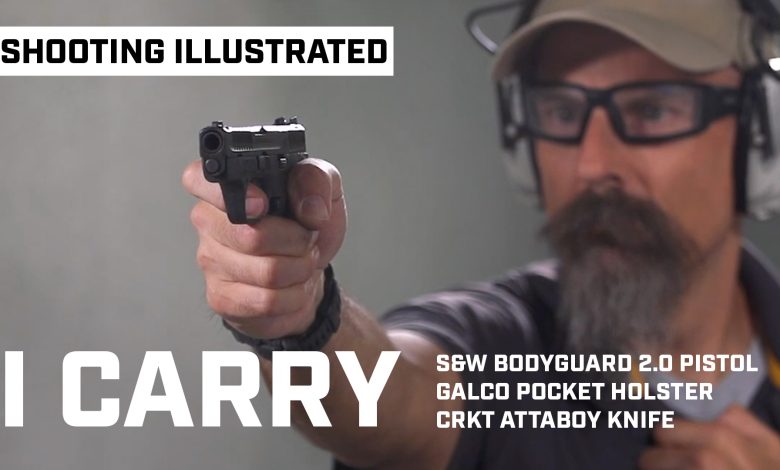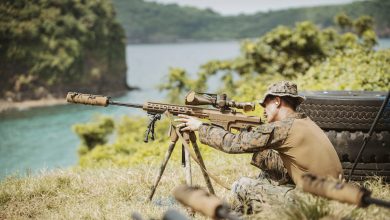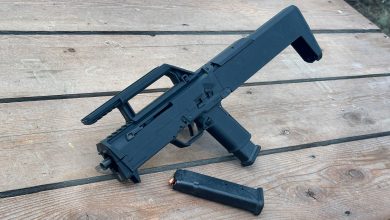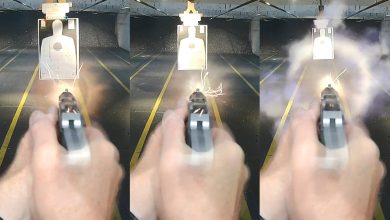I Carry: Smith & Wesson Bodyguard 2.0 Pistol in a Galco Holster

Hey everyone, this is Shooting Illustrated bringing you another episode of “I Carry.” In today’s feature, we’re examining the new Smith & Wesson Bodyguard 2.0 and some related gear. Let’s take a closer look at this kit:
Firearm: Smith & Wesson Bodyguard 2.0 (MSRP: $449)
Today’s “I Carry” centers around the new Bodyguard 2.0 from Smith & Wesson. Building on the success of the Shield Plus, where Smith & Wesson redesigned the grip to accommodate a double-stack magazine to increase capacity, the Bodyguard 2.0 uses that same voodoo to increase round count from the original six rounds to either 10 rounds in a flush-fit magazine or 12 rounds in an extended version. The slide and trigger guard keep the same profile as the original Bodyguard to maintain the same holster fits, in much the same way as the Shield Plus.
Sizewise, the Bodyguard 2.0 is still quite small: 5.5 inches overall length, 4 inches tall, .9 inch wide and weighing only 9.8 ounces unloaded. It’s smaller than even the SIG Sauer P365, even the .380 ACP version. It’s about the ideal size for deep-concealment use or to serve as a backup, carried in an ankle holster, for example. Now with 11 rounds on-board with a flush fit magazine and significant improvements in .380 ACP ballistics, there’s a lot less to give up when opting for something smaller than a 9 mm.
But, the increased capacity isn’t the only upgrade. The trigger has received the M2.0 upgrade, using a bladed-safety in the center of the trigger to protect against inadvertent firing should the gun be dropped. The slide has more aggressive cocking serrations both fore and aft for better administrative handling of the Bodyguard. Grip texture also mirrors the M2.0 upgrades, giving the Bodyguard 2.0 a more aggressive grip that increases purchase in the hand. Lastly, the Bodyguard 2.0 uses a striker-fired action rather than the hammer-fired system in the original. All these improvements add up to what is just about a brand-new gun – that just happens to fit holsters for the original.
Is the Bodyguard 2.0 a replacement for a double-stack 9 mm handgun? With the improvements Smith & Wesson has made to this pistol, it’s certainly a lot closer. It is both easier to shoot than the original and more capacious, which only adds to its appeal. And, there’s the similarity to Smith & Wesson’s M&P9 M2.0 series of handguns, making it ideal as a backup or deep-concealment firearm for those who prefer the M&P. In the end, choosing between a small .380 ACP pistol and a larger 9 mm comes down to the intended use, skill level of the user and external factors like the need for absolute concealment. With the Bodyguard 2.0, it’s now a lot less of a compromise, and that’s a good thing indeed.
Holster: Galco Pocket Protector (MSRP: $44)
We wanted to highlight the small size of the Bodyguard 2.0 with a pocket holster, and Galco Gunleather’s Pocket Protector is perfect for this role. Constructed of rough-out steerhide to keep the holster anchored in the pocket, the mouth is reinforced with metal to facilitate a smooth draw. Rounding out the Pocket Protector is a hook just under the trigger guard designed to catch the edge of the pocket on the draw, with the goal being to retain the holster inside the pants throughout the draw stroke.
A note on reholstering when using a pocket holster: Best practices when reholstering a pistol carried in the pocket should always include removing the holster from the pocket and using extreme caution to avoid muzzling the support hand. This can be practiced at home in dry practice with an unloaded pistol. It does take a bit more time, but it is the safest way to return a pistol to a holster that will be carried in the pocket.
Accessory: CRKT Attaboy Deadbolt (MSRP: $100)
Rounding out today’s kit is a perfectly fitting pocketknife, the Attaboy from Columbia River Knife & Tool Company. With a 2.73-inch, D2 steel drop-point blade and glass-filled nylon scales, the Attaboy weights a scant 3.5 ounces. It’s super lightweight, takes and maintains a good working edge and uses CRKT’s IKBS ball-bearing system with assist to open the knife smoothly using a flipper projection. A minimalist pocket clip holds the Attaboy low in the pocket for discreet carry.
My favorite part on the Attaboy, though, comes in how the knife is closed. I’ve long detailed my dislike of liner- and frame-locks for the simple reason that those methods require that a finger be placed in the path of the blade as it is being closed. The Attaboy uses CRKT’s Deadbolt mechanism, which is a pushbutton action that allows the user to push with the thumb and close with a finger on the back of the blade. It’s a safer mechanism that’s also quite easy to operate, making it a cinch to both open and close with one hand.
Read the full article here







